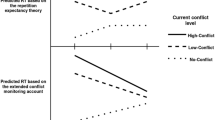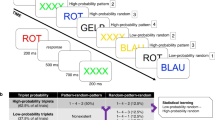Abstract
According to the 'conflict-monitoring' model, a leading theory of cognitive control1,2,3,4, information-processing conflict registered in the anterior cingulate cortex (ACC) triggers the prefrontal cortex to reduce conflict susceptibility. Here we show that the existing empirical support for an online modulation of susceptibility to conflict through immediately preceding conflict, the 'conflict-adaptation effect'1,5, needs to be reevaluated. In a human cognitive control task, we found that it was not the stimulus-independent level of conflict that was responsible for the conflict-adaptation effect but rather an episodic memory phenomenon: stimulus-specific priming6.
This is a preview of subscription content, access via your institution
Access options
Subscribe to this journal
Receive 12 print issues and online access
$209.00 per year
only $17.42 per issue
Buy this article
- Purchase on Springer Link
- Instant access to full article PDF
Prices may be subject to local taxes which are calculated during checkout



Similar content being viewed by others
References
Botvinick, M.M., Braver, T.S., Barch, D.M., Carter, C.S. & Cohen, J.D. Psychol. Rev. 108, 624–652 (2001).
Botvinick, M.M., Nystrom, L., Fissell, K., Carter, C.S. & Cohen, J.D. Nature 402, 179–181 (1999).
Carter, C.S. et al. Science 280, 747–749 (1998).
MacDonald, A.W., Cohen, J.D., Stenger, V.A. & Carter, C.S. Science 288, 1835–1837 (2000).
Gratton, G., Coles, M.G.H. & Donchin, E. J. Exp. Psychol. Gen. 4, 480–506 (1992).
Logan, G.D. Psychol. Rev. 109, 376–400 (2002).
Eriksen, B.A. & Eriksen, C.W. Percept. Psychophys. 16, 143–149 (1974).
Cohen, A. & Shoup, R. Cognit. Psychol. 32, 128–181 (1997).
Hommel, B. Vis. Cognit. 5, 183–216 (1998).
Pashler, H. & Baylis, G. J. Exp. Psychol. Learn. Mem. Cogn. 17, 33–48 (1991).
Bush, G., Luu, P. & Posner, M.I. Trends Cogn. Sci. 4, 215–221 (2000).
Posner, M.I. & Dehaene, S. Trends Neurosci. 17, 75–79 (1994).
Acknowledgements
Supported by National Institute of Aging R01 AG19296-01A1 (to U.M.) and National Institute of Mental Health R01 MH64119 (to E.A.).
Author information
Authors and Affiliations
Corresponding author
Ethics declarations
Competing interests
The authors declare no competing financial interests.
Rights and permissions
About this article
Cite this article
Mayr, U., Awh, E. & Laurey, P. Conflict adaptation effects in the absence of executive control. Nat Neurosci 6, 450–452 (2003). https://doi.org/10.1038/nn1051
Received:
Accepted:
Published:
Issue Date:
DOI: https://doi.org/10.1038/nn1051
This article is cited by
-
Cognitive control adjustments are dependent on the level of conflict
Scientific Reports (2024)
-
Schizophrenia patients show impaired bottom-up processing and attentional adjustment
Current Psychology (2023)
-
Moving beyond response times with accessible measures of manual dynamics
Scientific Reports (2022)
-
The role of working memory for task-order coordination in dual-task situations
Psychological Research (2022)
-
On the reliability of behavioral measures of cognitive control: retest reliability of task-inhibition effect, task-preparation effect, Stroop-like interference, and conflict adaptation effect
Psychological Research (2022)



